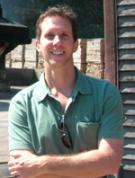David W. Montgomery

Education: BA in Individualized Major Program (Religious Studies, Sports Science, and Pre-medicine), Indiana University; MA in Interdisciplinary Program in Health and Humanities, Michigan State University; MA in International Relations, Boston University; PhD in Religion, Boston University
David W. Montgomery is a Visiting Assistant Professor in the Department of Anthropology at the University of Pittsburgh and Director of Program Development for CEDAR—Communities Engaging with Difference and Religion.
When did you first develop an interest in Slavic, East European and Eurasian Studies?
My interest in Slavic, East European and Eurasian Studies developed on two separate fronts. During the summer before my senior year of university, I did research for my undergraduate thesis at the Hastings Center in New York and the U.S. Olympic Analytical Laboratory in Los Angeles. At both places, I became friends with visiting scholars from Bulgaria, Hungary, and Yugoslavia. The following summer, while visiting some of these friends in Croatia, the war began in Slovenia. Thus, at a time when Eastern Europe was undergoing great change, my interest in the Balkans began. Years later, after spending two years working and traveling around the world and subsequently working with the U.S. House of Representatives, I felt it important to more intimately learn a language and culture prior to returning for my doctoral studies. Looking at various options, I applied to be a Peace Corps Volunteer and asked to be sent someplace to which tourists do not normally travel. I ended up in Kyrgyzstan, and thus began my ongoing interest in Central Asia.
How have your interests changed since then?
When I first encountered both the Balkans and Central Asia, my interests were primarily connected to the lives of my friends in the region. Later, while pursuing my doctorate, regions I had grown to have a deep personal interest in, became the focus of my professional work. As time passes, my interests in the region continue to broaden yet still remain rooted in a desire to understand interpersonal relationships and what constitutes a meaningful life. Thusly, I continue to be interested in the personal and political role of religion in everyday life as well as questions of well-being and the processes by which people celebrate joys and socially navigate the challenges they face.
What is your current research project?
Geographically focused on Central Asia and the Balkans, my research interests connect religion, everyday life, well-being, and politics through a project on the transmission of religious knowledge in Kyrgyzstan (working title: "Practicing Islam: Knowledge, Experience, and Social Navigation in the Kyrgyz Republic"); one on Islam, secularism, and security in Central Asia (with John Heathershaw); and another on "Everyday Life in the Balkans". As well, I am involved in the expansion of CEDAR—Communities Engaging with Difference and Religion, a global educational network enabling members of disparate communities to recognize and accept their differences as they work toward a civil society. Within the region, this includes the formation of the Balkan Summer School on Religion and Public Life and ongoing efforts to develop programs in Central Asia and the Caucasus. In addition to the CEDAR programs, I am finishing a book about the CEDAR pedagogy (with Adam Seligman and Rahel Wasserfall, working title: Living Together Differently).
What do you value about your ASEEES membership?
I appreciate that ASEEES advocates for the importance of regional studies; facilitates research and scholarly exchange across such a large and diverse part of the world; and encourages interdisciplinary engagement through its annual convention and Slavic Review.
Besides your professional work, what other interests and/or hobbies do you enjoy?
I enjoy long-distance running, cycling, and hiking, as well as poetry, jazz, and art.
Photo caption: Montgomery with friends and interlocutors in southern Kyrgyzstan
